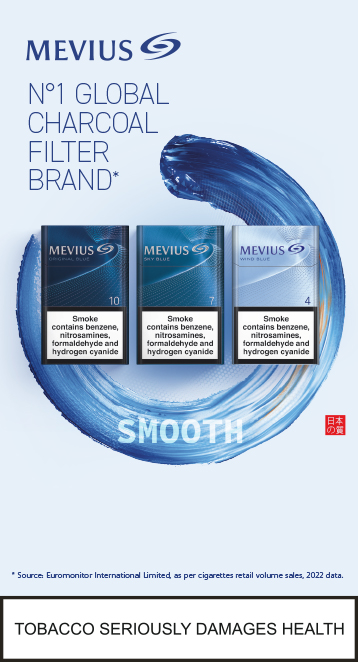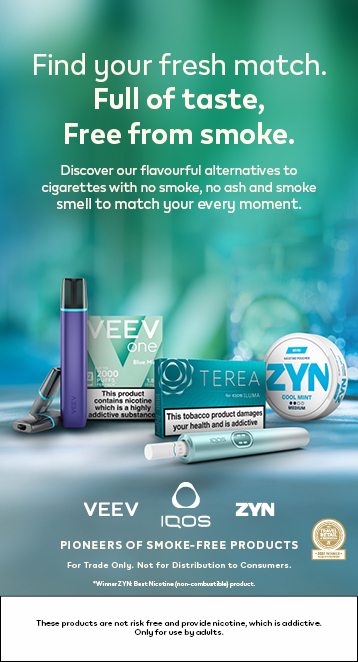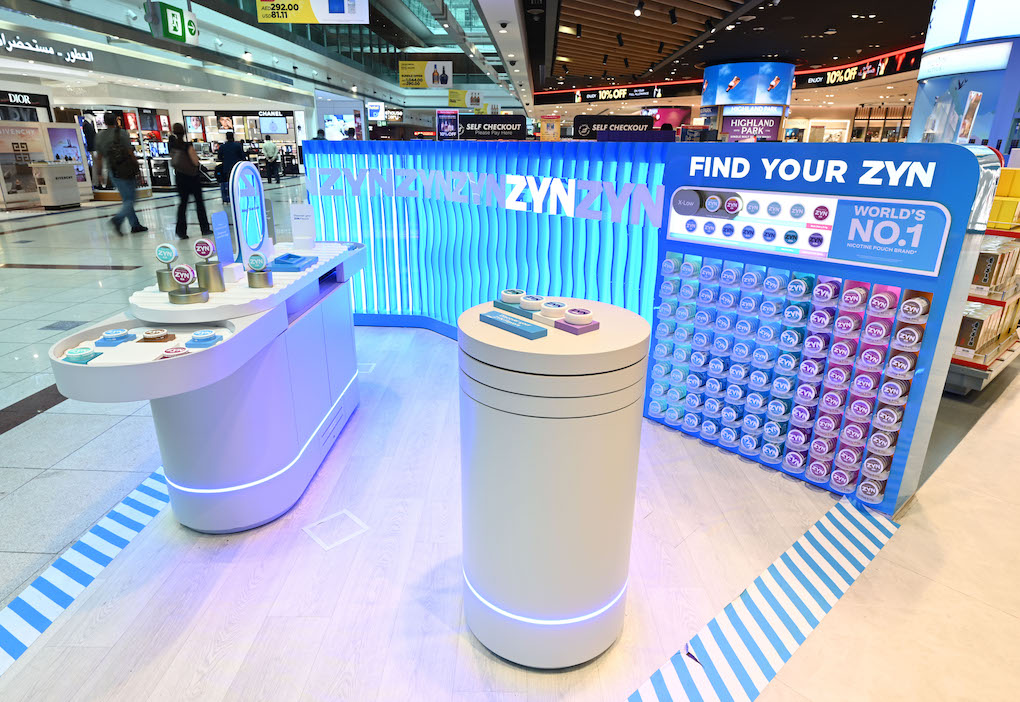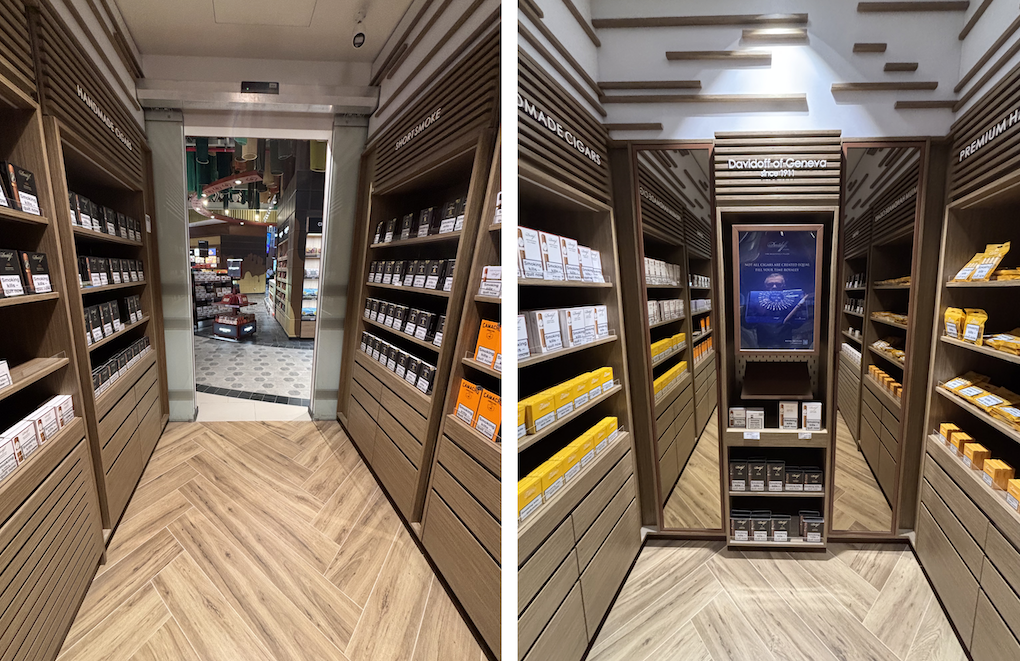 |
“More and more we’ll see airports competing on the basis of the facilities they offer passengers. This will be part of the next phase of industry development.“ |
David Francis Worldwide Duty Free Vice President JTI |
The opening of five new smoking lounges at Dubai International Airport last month is just one element in Japan Tobacco International’s (JTI) drive to build partnerships with airports and travel retailers. That’s according to JTI Worldwide Duty Free Vice President David Francis.
Speaking to The Moodie Report at the inauguration of the brand owner’s latest lounges – including the world’s largest at an airport – Francis said: “For us the openings of these smoking lounges are highly significant, not only because it’s at Dubai International, which is a market leader, but also because we were given sufficient space to create something of real quality. The existing lounges here at Dubai were not of very good quality, and these new ones take the experience to a new level.”
To recap, JTI and Dubai Airports, in partnership with JCDecaux, inaugurated the five smoking lounges across all three terminals at Dubai International in late March. At 250sq m, the main lounge at T1 is said to be the largest at an airport. The lounges cover space of 600sq m in total, are branded under the Winston brand name and managed by JCDecaux under a five-year deal with Dubai Airports.
Having visited them, it’s clear that the environment is very different to the stale, uninviting smoking lounges at most airports. There’s excellent ventilation, comfortable seating, space to work and even views across the runway. With these installations, Dubai joins airports such as Munich, Zürich, Moscow, Kuala Lumpur and Geneva, where JTI has introduced this concept.
Francis added: “The smoking lounges have proved to be a win-win solution for all parties: smokers are enjoying a break in a pleasant environment especially designed for them, non-smokers benefit from a smoke-free environment and the airport is providing travellers with a high quality service.”
The smoking lounge programme is of course separate and distinct from the company’s retail sales drive in duty free stores – but there is an element of brand-building, as underlined by the subtle though distinctive Winston branding both outside and inside the lounges.
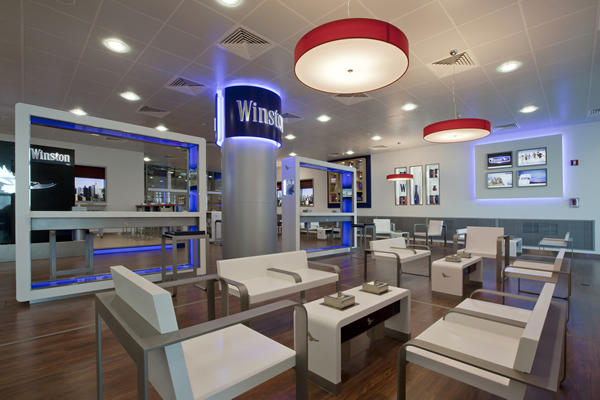 |
The new smoking lounges at Dubai carry visually striking designs and broad, open space |
Francis said: “It’s the kind of partnership we want to strike with airports. We estimate that 20-25% of adult passengers through Dubai International are smokers, and there’s a very high proportion of transit passengers with long transit times. So we are providing a service for adult smokers, while also not affecting the majority of travellers who are non-smokers.”
Given the paucity of facilities for adult smokers, this highly significant group has been neglected by many airports, JTI argues, though Francis said change is happening.
“I think more and more we’ll see airports competing on the basis of the facilities they offer passengers. This will be part of the next phase of industry development. Certainly if you take regional hubs that are aiming to attract transfer passengers, the services that the airport provides will be key in dictating how many people use particular routes.”
The smoking lounge approach has also evolved since JTI began its drive to introduce these facilities to airports in 2003. “We are well ahead of where we were when we began,” noted Francis, “especially in ventilation expertise advice that we can provide for the lounges, which makes such a difference to the experience. We’ve also built up a body of expertise over the years. We have a dedicated team in Geneva whose job is to oversee smoking lounges. That takes investment and commitment. Our strategy is to develop relationships with airport authorities and with retailers, and that’s where the benefits lie for JTI in this channel.”
 |
The lounges form part of JTI’s strategy to deepen partnerships with airports and retailers |
And that emphasis on relationships looks to be paying off in other ways, notably as the duty free business grows. “Duty free at JTI tends to reflect the strength of our domestic markets, and we had a very strong performance last year,” said Francis. “I expect that to continue in 2012 not only because the channel mirrors domestic growth, but also because we are working more effectively with operators at the airports.”
That comes from a focus on growing the size of the basket, not just on narrow self-interest, said Francis. “We can’t just offer solutions to the retailers that benefit our brands, but don’t grow their business. We have to take account of what we can do to grow the entire cake. I consider this to be different from some other brand owners: it’s not all about space or signage for us, it’s also beyond the category; it’s about the overall business.
“When we examine the impact of any solutions that we propose, we look at basket data for the retailer. That’s the bottom line. We put a lot of effort into analysis. We now have the benefit of the experience of some members in our team that come from duty free retail background. And that’s invaluable in helping us see the business through the retailer’s eyes. Now when we’re measuring the effect of a new installation, say, we look not only as how tobacco has grown, but at how the multi-purchase basket has grown.
“It’s not possible to grow tobacco in a sustainable way while at the same time seeing confectionery or fashion going down. It has to be part of the whole approach.”
JTI is engaged with a number of travel retailers – and is even partnering with brands from other categories – to develop cross-category solutions that will help optimise store layouts and grow basket sizes. It’s a selective approach – not all retailers are receptive – but Francis argues that tobacco remains a fundamental footfall driver into stores.
“The idea that you can place tobacco anywhere in the store, even down the back, and people will seek it out, is simply not true,” he said. “And retailers are changing their strategies around tobacco to reflect that. We’ve seen a refreshingly open approach to tobacco from key operators at locations such as Madrid, Alicante, Zürich and other places in recent years. On almost every trip I make, I see a fresh opportunity to grow the business. And for duty free as an industry, tobacco still presents a huge opportunity if we can grasp it.”
For JTI, that opportunity lies mainly around it Global Flagship Brands, principally Winston, Camel and Mild Seven depending on the region, with other regional brands featured in certain markets.
“We tend to look at the profile of adult passengers through each airport, and even down to the terminal or shop, to determine how best to use our resources,” said Francis. “It’s not simply about installing the brand that is strongest in that region. We are also looking closely at the Chinese opportunity too, and at what brands we can put before them that will enable the retailer to grow their overall basket sizes. The Chinese want super-premium products and that’s a big opportunity for the whole industry.”
Where there are opportunities, there are challenges too. Among the biggest is “to open retailers’ minds to the potential of tobacco”. Francis said: “We are making progress but there is a long way to go. Regulation of course is a challenge but I’ve been in the business for 35 years, and it is a fact of life. Regulators have objectives to achieve which we fully respect. It’s a case of achieving those objectives while catering to the needs of both non-smokers and adult smokers too. And that’s exactly what the smoking lounges do: they help achieve a common sense outcome for all travellers.”
 |
With David Francis (left) at the inauguration of the Dubai smoking lounges were (l-r) The Moodie Report Executive Director – Deputy Publisher Dermot Davitt, Dubai Duty Free Executive Vice Chairman Colm McLoughlin and President George Horan |


